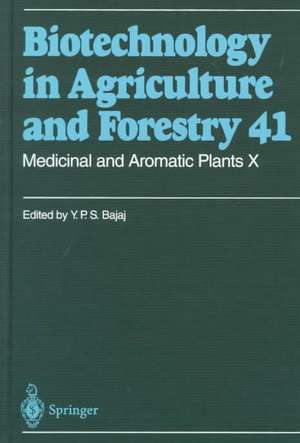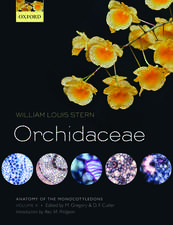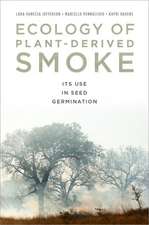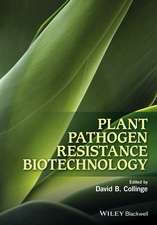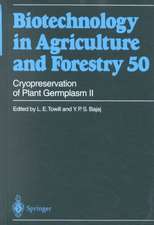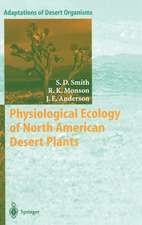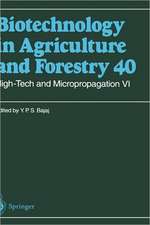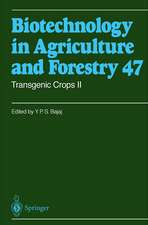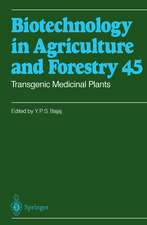Medicinal and Aromatic Plants X: Biotechnology in Agriculture and Forestry, cartea 41
Editat de Y. P. S. Bajajen Limba Engleză Hardback – 18 noi 1997
| Toate formatele și edițiile | Preț | Express |
|---|---|---|
| Paperback (1) | 1824.64 lei 6-8 săpt. | |
| Springer Berlin, Heidelberg – 13 oct 2012 | 1824.64 lei 6-8 săpt. | |
| Hardback (1) | 1830.80 lei 6-8 săpt. | |
| Springer Berlin, Heidelberg – 18 noi 1997 | 1830.80 lei 6-8 săpt. |
Din seria Biotechnology in Agriculture and Forestry
- 15%
 Preț: 655.60 lei
Preț: 655.60 lei - 18%
 Preț: 968.65 lei
Preț: 968.65 lei - 18%
 Preț: 1841.68 lei
Preț: 1841.68 lei - 18%
 Preț: 1843.11 lei
Preț: 1843.11 lei - 18%
 Preț: 1841.99 lei
Preț: 1841.99 lei - 18%
 Preț: 966.78 lei
Preț: 966.78 lei - 18%
 Preț: 958.73 lei
Preț: 958.73 lei - 18%
 Preț: 1832.39 lei
Preț: 1832.39 lei - 15%
 Preț: 658.22 lei
Preț: 658.22 lei - 18%
 Preț: 959.19 lei
Preț: 959.19 lei - 18%
 Preț: 1837.45 lei
Preț: 1837.45 lei - 18%
 Preț: 1837.88 lei
Preț: 1837.88 lei - 18%
 Preț: 961.41 lei
Preț: 961.41 lei - 15%
 Preț: 651.99 lei
Preț: 651.99 lei - 15%
 Preț: 645.79 lei
Preț: 645.79 lei - 15%
 Preț: 649.06 lei
Preț: 649.06 lei - 18%
 Preț: 1831.12 lei
Preț: 1831.12 lei - 18%
 Preț: 1839.50 lei
Preț: 1839.50 lei - 18%
 Preț: 1829.05 lei
Preț: 1829.05 lei - 18%
 Preț: 1834.77 lei
Preț: 1834.77 lei - 15%
 Preț: 650.19 lei
Preț: 650.19 lei - 18%
 Preț: 1828.74 lei
Preț: 1828.74 lei - 15%
 Preț: 668.04 lei
Preț: 668.04 lei - 18%
 Preț: 1831.60 lei
Preț: 1831.60 lei - 15%
 Preț: 648.89 lei
Preț: 648.89 lei - 18%
 Preț: 1833.48 lei
Preț: 1833.48 lei - 18%
 Preț: 1831.73 lei
Preț: 1831.73 lei - 18%
 Preț: 1824.01 lei
Preț: 1824.01 lei - 18%
 Preț: 1829.36 lei
Preț: 1829.36 lei - 15%
 Preț: 644.82 lei
Preț: 644.82 lei - 18%
 Preț: 1828.60 lei
Preț: 1828.60 lei - 18%
 Preț: 1224.54 lei
Preț: 1224.54 lei
Preț: 1830.80 lei
Preț vechi: 2232.68 lei
-18% Nou
Puncte Express: 2746
Preț estimativ în valută:
350.33€ • 366.51$ • 291.02£
350.33€ • 366.51$ • 291.02£
Carte tipărită la comandă
Livrare economică 02-16 aprilie
Preluare comenzi: 021 569.72.76
Specificații
ISBN-13: 9783540627272
ISBN-10: 3540627278
Pagini: 484
Ilustrații: XX, 460 p. 226 illus., 1 illus. in color.
Dimensiuni: 155 x 235 x 35 mm
Greutate: 0.85 kg
Ediția:1998
Editura: Springer Berlin, Heidelberg
Colecția Springer
Seria Biotechnology in Agriculture and Forestry
Locul publicării:Berlin, Heidelberg, Germany
ISBN-10: 3540627278
Pagini: 484
Ilustrații: XX, 460 p. 226 illus., 1 illus. in color.
Dimensiuni: 155 x 235 x 35 mm
Greutate: 0.85 kg
Ediția:1998
Editura: Springer Berlin, Heidelberg
Colecția Springer
Seria Biotechnology in Agriculture and Forestry
Locul publicării:Berlin, Heidelberg, Germany
Public țintă
ResearchCuprins
I Actinidia polygama (Japanese name Matatabi): In Vitro Culture, Micropropagation, and the Production of Monoterpenes and Triterpenoids.- II Alkanna tinctoria T. (Alkanets): In Vitro Culture and the Production of Alkannin and Other Secondary Metabolites.- III Arnebia euchroma: In Vitro Culture and the Production of Shikonin and Other Secondary Metabolites.- IV Campanula (Bellflower) Species: In Vitro Culture, Micropropagation, and the Production of Anthocyanins, Polyacetylenes, and Other Secondary Metabolites.- V Catharanthus roseus (Periwinkle): In Vitro Culture, and High-Level Production of Arbutin by Biotransformation.- VI Centella asiatica (L.) Urban. (Pennywort): Cell Culture, Production of Terpenoïds, and Biotransformation Capacity.- VII Chenopodium album L. (Fat Hen): In Vitro Cell Culture, and Production of Secondary Metabolites (Phytosterols and Ecdysteroids).- VIII Cornus kousa (Dogwood): In Vitro Culture, and the Production of Tannins and Other Phenolic Compounds.- IX Cynara cardunculus subsp. flavescens (Cardoon): In Vitro Culture, and the Production of Cyprosins — Milk Clotting Enzymes.- X Ephedra Species: In Vitro Culture, Micropropagation and the Production of Ephedrine and Other Alkaloids.- XI Euglena gracilis Z: Biotransformation of Terpenoids and Related Compounds.- XII Haplophyllum patavinum (L.) G. Don fil. (Paduan rue): In Vitro Regeneration, and the Production of Coumarin Compounds.- XIII Morus Species (Mulberry): In Vitro Culture, Micropropagation, and the Formation of Mulberrofuran, Kuwanol, and Other Secondary Metabolites.- XIV Oenothera Species (Evening Primrose): In Vitro Regeneration, Production of Flavonoids, Fatty Acids, and Other Secondary Metabolites.- XV Otacanthus Species: In Vitro Culture, Plant Propagation, and the Production ofEssential Oil.- XVI Oxalis Species: In Vitro Culture, Micropropagation, and the Formation of Anthocyanins.- XVII Polypodium vulgare L. (Wood Fern): In Vitro Cultures and the Production of Phytoecdysteroids.- XVIII Rosmarinus officinalis L. (Rosemary): In Vitro Culture, Regeneration of Plants, and the Level of Essential Oil and Monoterpenoid Constituents.- XIX Sesamum indicum L. (Sesame): In Vitro Culture, and the Production of Naphthoquinone and Other Secondary Metabolites.- XX Solanum mammosum L. (Terong Susu): In Vitro Culture and the Production of Steroidal Alkaloids and Other Secondary Metabolites.- XXI Taxus Species (Yew): In Vitro Culture, and the Production of Taxol and Other Secondary Metabolites.- XXII Tephrosia vogelii Hook f.: In Vitro Culture, and the Production of Rotenoids and Other Secondary Metabolites.
Textul de pe ultima copertă
Like the previous nine volumes published between 1988 and 1996, Medicinal and Aromatic Plants X is unique in its approach. It comprises 22 chapters dealing with the distribution, importance, conventional propagation, micropropagation, tissue culture studies, and the in vitro production of important medicinal and pharmaceutical compounds in various species of Actinidia, Alkanna, Arnebia, Campanula, Catharanthus, Centella, Chenopodium, Cornus, Cyanara, Ephedra, Euglena, Haplophyllum, Morus, Oenothera, Otacanthus, Oxalis, Polypodium, Rosmarinus, Sesamum, Solanum, Taxus, and Tephrosia. This book is tailored to the needs of advanced students, teachers, and research scientists in the field of pharmacy, plant tissue culture, phytochemistry, biochemical engineering, and plant biotechnology in general.
Caracteristici
In vitro breeding of pharmaceutically important plants Production of pharmaceutically important substances through plant tissue cultures Alphabetical order of the chapters, each devoted to one plant
